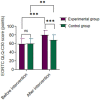Application value of self-management manual combined with case management superiority model in postoperative management of nasopharyngeal carcinoma after radiotherapy
- PMID: 37560242
- PMCID: PMC10408543
Application value of self-management manual combined with case management superiority model in postoperative management of nasopharyngeal carcinoma after radiotherapy
Abstract
Objective: To explore the application value of the self-management manual combined with the case management model in postoperative management of nasopharyngeal carcinoma after radiotherapy.
Methods: Eighty-four patients with nasopharyngeal carcinoma admitted to Yingtan People's Hospital from May 2020 to April 2022 were retrospectively included in this study. They were divided into the experimental group (receiving self-management manual combined with case management mode scheme, n=42) and the control group (receiving continuous management after conventional nasopharyngeal carcinoma radiotherapy, n=42) according to mode differences. The cancer-related fatigue [Cancer Fatigue Scale (CFS)], comfort status [General Comfort Questionnaire (GCQ)], self-management efficacy [Chinese Strategies Used by People to Promote Health (C-SUPPH)], self-care ability (self-care ability measurement), pain score [Visual analogue scale (VAS)], and quality of life [European Organization for Research and Treatment of Cancer QLQ-C30 (EORTC QLQ-C30)] were compared between the two groups after 4 weeks of radiotherapy. The adverse reactions of the two groups were recorded. Combined with periodic review and follow-up records, the prognostic factors of the two groups of patients were analyzed.
Results: After treatment, the scores of physical fatigue (12.83±1.10), emotional fatigue (9.78±1.32), cognitive fatigue (5.62±1.31), and total score of CFS (28.24±2.26) in the experimental group were 12.83±1.10. The control group physical fatigue (13.90±1.25) points, emotional fatigue (10.55±1.40) points, cognitive fatigue (6.80±1.75) points, and total CFS (31.33±2.59) points in both groups were lower than before treatment. The experimental group was lower than the control group (ALL P<0.05). The physiological, psychological, spiritual, socio-cultural, and environmental scores of the experimental group were higher than those of the control group (all P<0.05). The scores of health knowledge, self-care skills, self-care responsibility, and self-concept score of patients in the experimental group were higher than the control group (all P<0.05). After intervention, the VAS score of the experimental group was lower than that of the control group (P<0.05). After intervention, the EORTC QLQ-C30 score of both groups increased significantly as compared with pre-intervention. The score in the experimental group was significantly higher than that in the control group [(80.05±10.72) vs (68.11±12.10), P<0.05]. Postoperative (various) adverse reactions in the experimental group were lower than the control group (all P<0.05). The factors influencing the prognosis of nasopharyngeal carcinoma patients were age, tumor stage, and intervention mode by Cox model analysis (all P<0.05).
Conclusion: The self-management manual combined with the case management mode can alleviate cancer fatigue, improve postoperative self-management ability, self-care ability, and quality of life of patients with nasopharyngeal cancer radiotherapy, reduce the occurrence of adverse reactions and improve the prognosis of patients. It is worth promoting in clinical settings.
Keywords: Nasopharyngeal carcinoma; application value; case management; postoperative radiotherapy; self-management.
AJTR Copyright © 2023.
Conflict of interest statement
None.
Figures


Similar articles
-
Effects of Network-based Positive Psychological Nursing Model on Negative Emotions, Cancer-related Fatigue, and Quality of Life in Cervical Cancer Patients with Post-operative Chemotherapy.Ann Ital Chir. 2024;95(4):542-551. doi: 10.62713/aic.3514. Ann Ital Chir. 2024. PMID: 39186334
-
[Correlation of quality of life with self-care efficacy and social support in patients with nasopharyngeal carcinoma after radiotherapy].Zhong Nan Da Xue Xue Bao Yi Xue Ban. 2019 Jun 28;44(6):672-678. doi: 10.11817/j.issn.1672-7347.2019.06.010. Zhong Nan Da Xue Xue Bao Yi Xue Ban. 2019. PMID: 31304929 Chinese.
-
Influence of self-management exercise intervention on the cancer related fatigue severity and self-management efficacy of patients with non-small cell lung cancer after operation.J Pak Med Assoc. 2020 Sep;70 [Special Issue](9):88-93. J Pak Med Assoc. 2020. PMID: 33177734 Clinical Trial.
-
Outcomes of xerostomia-related quality of life for nasopharyngeal carcinoma treated by IMRT: based on the EORTC QLQ-C30 and H&N35 questionnaires.Expert Rev Anticancer Ther. 2015 Jan;15(1):109-19. doi: 10.1586/14737140.2015.961427. Epub 2014 Sep 18. Expert Rev Anticancer Ther. 2015. PMID: 25231774 Review.
-
The EORTC QLQ-C30 Summary Score as Prognostic Factor for Survival of Patients with Cancer in the "Real-World": Results from the Population-Based PROFILES Registry.Oncologist. 2020 Apr;25(4):e722-e732. doi: 10.1634/theoncologist.2019-0348. Epub 2019 Oct 31. Oncologist. 2020. PMID: 32297435 Free PMC article. Review.
Cited by
-
Development and psychometric testing of a self-management scale for cancer survivors with radiotherapy/chemotherapy-induced oral mucositis in China.Asia Pac J Oncol Nurs. 2024 Dec 30;12:100650. doi: 10.1016/j.apjon.2024.100650. eCollection 2025 Dec. Asia Pac J Oncol Nurs. 2024. PMID: 39896761 Free PMC article.
-
Effect of the postoperative pain management model on the psychological status and quality of life of patients in the advanced intensive care unit.BMC Nurs. 2024 Jul 19;23(1):496. doi: 10.1186/s12912-024-02144-z. BMC Nurs. 2024. PMID: 39030616 Free PMC article.
-
Adaptation and validation of the Chinese version of the Hospice Comfort Questionnaire-Patient (HCQ-P).PeerJ. 2025 Jun 10;13:e19562. doi: 10.7717/peerj.19562. eCollection 2025. PeerJ. 2025. PMID: 40520643 Free PMC article.
References
-
- Jin YN, Tang QN, Yao JJ, Xu XW, He WZ, Wang L, You YF, Peng KW, Jiang C, Xia LP. The effect of adding concurrent chemotherapy to radiotherapy for stage II nasopharyngeal carcinoma with undetectable pretreatment Epstein-Barr virus DNA: retrospective analysis with a large institutional-based cohort. Transl Oncol. 2021;14:100990. - PMC - PubMed
-
- Chen YP, Chan ATC, Le QT, Blanchard P, Sun Y, Ma J. Nasopharyngeal carcinoma. Lancet. 2019;394:64–80. - PubMed
-
- Lee AWM, Ng WT, Chan JYW, Corry J, Mäkitie A, Mendenhall WM, Rinaldo A, Rodrigo JP, Saba NF, Strojan P, Suárez C, Vermorken JB, Yom SS, Ferlito A. Management of locally recurrent nasopharyngeal carcinoma. Cancer Treat Rev. 2019;79:101890. - PubMed
-
- Chiang TY, Wang CH, Lin YF, You JF, Chen JS, Chen SC. Colorectal cancer in Taiwan: a case-control retrospective analysis of the impact of a case management programme on refusal and discontinuation of treatment. J Adv Nurs. 2018;74:395–406. - PubMed
LinkOut - more resources
Full Text Sources
Miscellaneous
